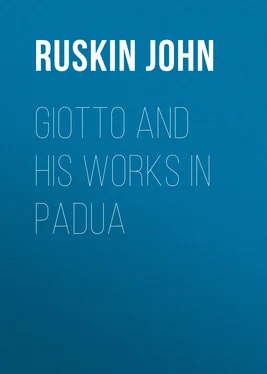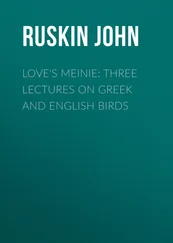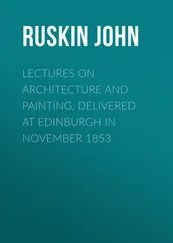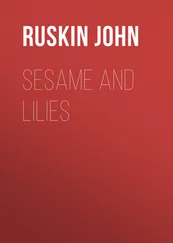John Ruskin - Giotto and his works in Padua
Здесь есть возможность читать онлайн «John Ruskin - Giotto and his works in Padua» — ознакомительный отрывок электронной книги совершенно бесплатно, а после прочтения отрывка купить полную версию. В некоторых случаях можно слушать аудио, скачать через торрент в формате fb2 и присутствует краткое содержание. Жанр: foreign_antique, foreign_home, literature_19, visual_arts, на английском языке. Описание произведения, (предисловие) а так же отзывы посетителей доступны на портале библиотеки ЛибКат.
- Название:Giotto and his works in Padua
- Автор:
- Жанр:
- Год:неизвестен
- ISBN:нет данных
- Рейтинг книги:3 / 5. Голосов: 1
-
Избранное:Добавить в избранное
- Отзывы:
-
Ваша оценка:
- 60
- 1
- 2
- 3
- 4
- 5
Giotto and his works in Padua: краткое содержание, описание и аннотация
Предлагаем к чтению аннотацию, описание, краткое содержание или предисловие (зависит от того, что написал сам автор книги «Giotto and his works in Padua»). Если вы не нашли необходимую информацию о книге — напишите в комментариях, мы постараемся отыскать её.
Giotto and his works in Padua — читать онлайн ознакомительный отрывок
Ниже представлен текст книги, разбитый по страницам. Система сохранения места последней прочитанной страницы, позволяет с удобством читать онлайн бесплатно книгу «Giotto and his works in Padua», без необходимости каждый раз заново искать на чём Вы остановились. Поставьте закладку, и сможете в любой момент перейти на страницу, на которой закончили чтение.
Интервал:
Закладка:
But what, it may be said by the reader, is the use of the works of Giotto to us ? They may indeed have been wonderful for their time, and of infinite use in that time; but since, after Giotto, came Leonardo and Correggio, what is the use of going back to the ruder art, and republishing it in the year 1854? Why should we fret ourselves to dig down to the root of the tree, when we may at once enjoy its fruit and foliage? I answer, first, that in all matters relating to human intellect, it is a great thing to have hold of the root: that at least we ought to see it, and taste it, and handle it; for it often happens that the root is wholesome when the leaves, however fair, are useless or poisonous. In nine cases out of ten, the first expression of an idea is the most valuable: the idea may afterward be polished and softened, and made more attractive to the general eye; but the first expression of it has a freshness and brightness, like the flash of a native crystal compared to the lustre of glass that has been melted and cut. And in the second place, we ought to measure the value of art less by its executive than by its moral power. Giotto was not indeed one of the most accomplished painters, but he was one of the greatest men, who ever lived. He was the first master of his time, in architecture as well as in painting; he was the friend of Dante, and the undisputed interpreter of religious truth, by means of painting, over the whole of Italy. The works of such a man may not be the best to set before children in order to teach them drawing; but they assuredly should be studied with the greatest care by all who are interested in the history of the human mind.
One point more remains to be noticed respecting him. As far as I am aware, he never painted profane subjects. All his important existing works are exclusively devoted to the illustration of Christianity. This was not a result of his own peculiar feeling or determination; it was a necessity of the period. Giotto appears to have considered himself simply as a workman, at the command of any employer, for any kind of work, however humble. "In the sixty-third novel of Franco Sacchetti we read that a stranger, suddenly entering Giotto's study, threw down a shield, and departed, saying, 'Paint me my arms on that shield.' Giotto looking after him, exclaimed, 'Who is he? What is he? He says, "Paint me my arms," as if he was one of the Bardi. What arms does he bear?'" 7But at the time of Giotto's eminence, art was never employed on a great scale except in the service of religion; nor has it ever been otherwise employed, except in declining periods. I do not mean to draw any severe conclusion from this fact; but it is a fact nevertheless, which ought to be very distinctly stated, and very carefully considered. All progressive art hitherto has been religious art; and commencements of the periods of decline are accurately marked, in illumination, by its employment on romances instead of psalters; and in painting, by its employment on mythology or profane history instead of sacred history. Yet perhaps I should rather have said, on heathen mythology instead of Christian mythology ; for this latter term—first used, I believe, by Lord Lindsay—is more applicable to the subjects of the early painters than that of "sacred history ." Of all the virtues commonly found in the higher orders of human mind, that of a stern and just respect for truth seems to be the rarest; so that while self-denial, and courage, and charity, and religious zeal, are displayed in their utmost degrees by myriads of saints and heroes, it is only once in a century that a man appears whose word may be implicitly trusted, and who, in the relation of a plain fact, will not allow his prejudices or his pleasure to tempt him to some colouring or distortion of it. Hence the portions of sacred history which have been the constant subjects of fond popular contemplation have, in the lapse of ages, been encumbered with fictitious detail; and their various historians seem to have considered the exercise of their imagination innocent, and even meritorious, if they could increase either the vividness of conception or the sincerity of belief in their readers. A due consideration of that well-known weakness of the popular mind, which renders a statement credible in proportion to the multitude of local and circumstantial details which accompany it, may lead us to look with some indulgence on the errors, however fatal in their issue to the cause they were intended to advance, of those weak teachers, who thought the acceptance of their general statements of Christian doctrine cheaply won by the help of some simple (and generally absurd) inventions of detail respecting the life of the Virgin or the Apostles.
Indeed, I can hardly imagine the Bible to be ever read with true interest, unless, in our reading, we feel some longing for further knowledge of the minute incidents of the life of Christ,—for some records of those things, which "if they had been written every one," the world could not have contained the books that should be written: and they who have once felt this thirst for further truth, may surely both conceive and pardon the earnest questioning of simple disciples (who knew not, as we do, how much had been indeed revealed), and measure with some justice the strength of the temptation which betrayed these teachers into adding to the word of Revelation. Together with this specious and subtle influence, we must allow for the instinct of imagination exerting itself in the acknowledged embellishment of beloved truths. If we reflect how much, even in this age of accurate knowledge, the visions of Milton have become confused in the minds of many persons with scriptural facts, we shall rather be surprised, that in an age of legends so little should be added to the Bible, than that occasionally we should be informed of important circumstances in sacred history with the collateral warning, "This Moses spake not of." 8
More especially in the domain of painting, it is surprising to see how strictly the early workmen confined themselves to representations of the same series of scenes; how little of pictorial embellishment they usually added; and how, even in the positions and gestures of figures, they strove to give the idea rather of their having seen the fact , than imagined a picturesque treatment of it. Often, in examining early art, we mistake conscientiousness for servility, and attribute to the absence of invention what was indeed the result of the earnestness of faith.
Nor, in a merely artistical point of view, is it less important to note, that the greatest advance in power was made when painters had few subjects to treat. The day has perhaps come when genius should be shown in the discovery of perpetually various interest amidst the incidents of actual life; and the absence of inventive capacity is very assuredly proved by the narrow selection of subjects which commonly appear on the walls of our exhibitions. But yet it is to be always remembered, that more originality may be shown in giving interest to a well-known subject than in discovering a new one; that the greatest poets whom the world has seen have been contented to retouch and exalt the creations of their predecessors; and that the painters of the middle ages reached their utmost power by unweariedly treading a narrow circle of sacred subjects.
Nothing is indeed more notable in the history of art than the exact balance of its point of excellence, in all things, midway between servitude and license. Thus, in choice and treatment of subject it became paralysed among the Byzantines, by being mercilessly confined to a given series of scenes, and to a given mode of representing them. Giotto gave it partial liberty and incipient life; by the artists who succeeded him the range of its scenery was continually extended, and the severity of its style slowly softened to perfection. But the range was still, in some degree, limited by the necessity of its continual subordination to religious purposes; and the style, though softened, was still chaste, and though tender, self-restrained. At last came the period of license: the artist chose his subjects from the lowest scenes of human life, and let loose his passions in their portraiture. And the kingdom of art passed away.
Читать дальшеИнтервал:
Закладка:
Похожие книги на «Giotto and his works in Padua»
Представляем Вашему вниманию похожие книги на «Giotto and his works in Padua» списком для выбора. Мы отобрали схожую по названию и смыслу литературу в надежде предоставить читателям больше вариантов отыскать новые, интересные, ещё непрочитанные произведения.
Обсуждение, отзывы о книге «Giotto and his works in Padua» и просто собственные мнения читателей. Оставьте ваши комментарии, напишите, что Вы думаете о произведении, его смысле или главных героях. Укажите что конкретно понравилось, а что нет, и почему Вы так считаете.












